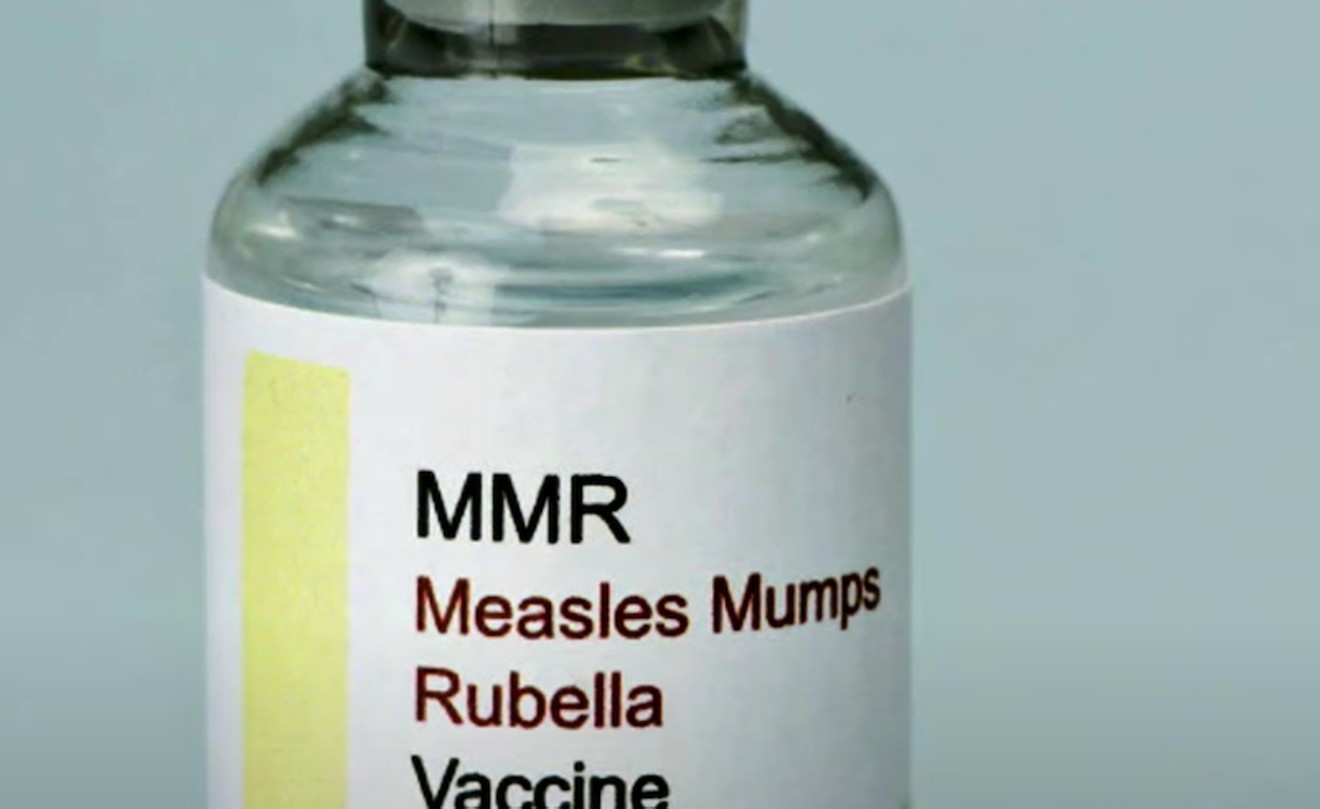Cases of measles are rising across the United States. According to the U.S. Centers for Disease Control and Prevention, 121 measles cases were recorded as of the second week of April, over twice the total number of cases in 2023 which reported 58.
This uptick in measles infections has not hit Texas yet. However, according to Dr. Peter Hotez, co-director of the Texas Children's Hospital Center for Vaccine Development and dean of the National School of Tropical Medicine at Baylor College of Medicine, cases are popping up from New Jersey to Louisiana.
Hotez said Texas is one of the more vulnerable states, given declining vaccination rates, an uptick in requests for vaccination exemptions for children and frequent travel from areas outside the United States where vaccination rates are low and measles is active in those countries.
Kirstin Short, bureau chief of epidemiology at the city's health department, added that Houston is a hotbed for the virus. She said this is due to residents' mobility, the constant influx of international travel, and, similar to the statewide trend, tanking vaccination rates.
“Our vaccination rate is not the world’s worst, but like much of the rest of the country, we’ve seen a drop in vaccination rates through COVID-19 and into this post-COVID-19 era,” Short said.
The increase in parents requesting conscientious exemptions to vaccinations for their children, such as the MMR vaccine that protects against measles, is especially detrimental when it comes to this virus, as roughly 47 percent of those infected are under five years old.
Parents opting not to vaccinate children against measles, is particularly alarming, Hotez says, as 65 percent of the hospitalizations in the United States that are linked to the virus are admissions of kids who are 5 and under.
At least one vaccine dosage provides 93 percent effective protection against measles and reduces the chance of this potentially high-risk group contracting the virus and developing a serious infection.
In 2020, Hotez wrote an op-ed piece for The New York Times to highlight the risks involved in children receiving the vaccine versus the dangers of those contracting the virus. He reported that if 10,000 kids get measles, on average, 20 percent will be hospitalized, 1,000 will get ear infections that could lead to permanent hearing loss and 500 could get measles pneumonia, which is the leading cause of death tied to the virus.
About 10 to 30 kids will die, and 10 children will get encephalitis, a condition that involves the inflammation of the brain. Mild cases of encephalitis could have flu-like symptoms, while severe cases could be life-threatening.
Hotez contrasted these findings by displaying what could occur when 10,000 kids get the MMR vaccine. Three children had fever-related seizures, and in less than 1 percent of cases, kids experienced abnormal blood clotting or allergic reactions to the vaccine.
The CDC's MMR vaccine protocol notes that healthcare professionals should not administer the immunization to pregnant women or women attempting to become pregnant. Doctors are also advised to tell patients who do receive the vaccine to avoid getting pregnant for at least a month after getting the immunization.
If a pregnant woman or woman trying to get pregnant receives a dosage of the vaccine, it can lead to health problems for the baby.
Data from the Texas Department of State Health Services reported that during the 2022-2023 school year, 3.24 percent of Texas kindergartners received an exemption for at least one immunization required to attend school.
The statewide percentage does not account for the range of vaccine exemption rates reported county-by-county. While the number of Harris County kindergartners was below the state percentage, with 2.45 percent having received an exemption for at least one vaccine, other counties reported significantly higher rates.
King County had the highest vaccine exemption rate, with roughly 25 percent of its kindergartners having received an exemption for at least one vaccine. Gaines County followed with about 18 percent, and Throckmorton County reported 14 percent.
Hotez noted that this could also be a fraction of the number of partially or completely unvaccinated kids.
“This doesn’t really say much about the homeschooled kids,” Hotez said. “By some estimates, we have over 700,000 homeschooled kids in Texas, and we have no idea what percentage of those are not getting vaccinated.
“You [also] have a number of kids, who even though their parents never requested the exemptions, are still not vaccinated,” he added.
When measles outbreaks occur, Short said, they can spiral out of control. At the department, she works to get ahead of the problem and does preliminary work if tipped off to a potential case to limit the possible exposures and start the groundwork for contact tracing.
Houston’s last measles case occurred in 2018, and there were no secondary cases caused by the first infection. Short added that within the last year to six months, the department has started to do the preliminary protocol, but there have been no measles cases.
To avoid possible infections, Short and her program with the department’s immunizations bureau, identifying pockets of lower vaccination rates across the city and further analyzing why those numbers are lower in certain areas, whether that be due to access or equity issues, vaccine awareness, or vaccine hesitancy.
She said it can also be difficult to determine the cause behind these figures because of how Texas’s vaccination system is set up. The state has an opt-in registry, meaning a provider cannot enter vaccination data unless the patient signs a form saying they can.
By this design, opt-in registries usually have lower proportions of information than opt-out registries.
According to Hotez, Houston residents still have a ways to go before they are out of the woods of experiencing an outbreak, as the peaks of the virus seen in the past occur in winter and spring.
“I do think, even if we don’t have measles this year, eventually we will, especially if these trends continue to increase," Hotez said. "We have people coming from all over the world, but ordinarily, that wouldn’t be a problem if everyone were vaccinated. But, we have these pockets of low vaccination rates where things start to take off.”
"I'm worried about reversing all our gains over the last 20 years," he added. "It also doesn't help that we have a major U.S. presidential candidate, Robert F. Kennedy, Jr., and his running mate running on an anti-vaccine platform. That's also not very helpful."
Support Us
Houston's independent source of
local news and culture
account
- Welcome,
Insider - Login
- My Account
- My Newsletters
- Contribute
- Contact Us
- Sign out
Measles On The Rise, Health Experts Say, and Houston Isn't Immune
Faith Bugenhagen April 22, 2024 4:30AM

Houston area physicians and public health officials recommend that those who qualify for the MMR vaccine ensure they are current with their immunizations as the virus is circulating in some parts of the country.
Screenshot
[
{
"name": "Related Stories / Support Us Combo",
"component": "11591218",
"insertPoint": "4",
"requiredCountToDisplay": "4"
},{
"name": "Air - Billboard - Inline Content",
"component": "11591214",
"insertPoint": "2/3",
"requiredCountToDisplay": "7"
},{
"name": "R1 - Beta - Mobile Only",
"component": "12287027",
"insertPoint": "8",
"requiredCountToDisplay": "8"
},{
"name": "Air - MediumRectangle - Inline Content - Mobile Display Size 2",
"component": "11591215",
"insertPoint": "12",
"requiredCountToDisplay": "12"
},{
"name": "Air - MediumRectangle - Inline Content - Mobile Display Size 2",
"component": "11591215",
"insertPoint": "4th",
"startingPoint": "16",
"requiredCountToDisplay": "12"
}
]
KEEP THE HOUSTON PRESS FREE...
Since we started the Houston Press, it has been defined as the free, independent voice of Houston, and we'd like to keep it that way. With local media under siege, it's more important than ever for us to rally support behind funding our local journalism. You can help by participating in our "I Support" program, allowing us to keep offering readers access to our incisive coverage of local news, food and culture with no paywalls.
Trending News
- Dan Patrick Sets Off Alarm Bells For Public School Advocates With His Property Tax Trial Balloon
- Fort Bend ISD Trustees Stop Short Of Allowing Superintendent To Control Book Flow
- What's Behind Gary Douglas's Scientology Knockoff?
-
Sponsored Content From: [%sponsoredBy%]
[%title%]

Don't Miss Out
SIGN UP for the latest
news, free stuff and more!
Become a member to support the independent voice of Houston
and help keep the future of the Houston Press FREE
Use of this website constitutes acceptance of our
terms of use,
our cookies policy, and our
privacy policy
The Houston Press may earn a portion of sales from products & services purchased through links on our site from our
affiliate partners.
©2024
Houston Press, LP. All rights reserved.





